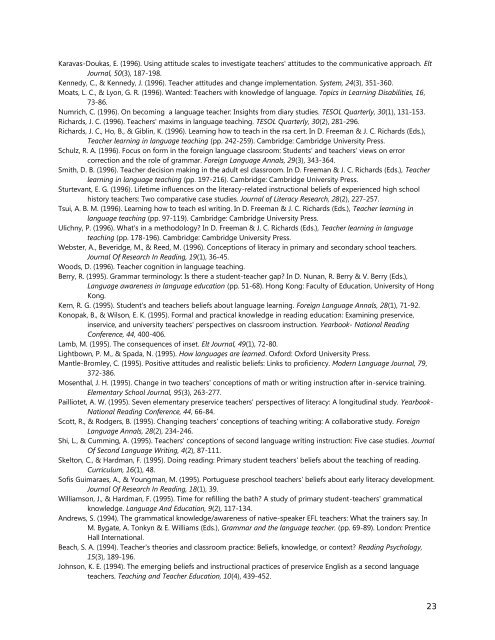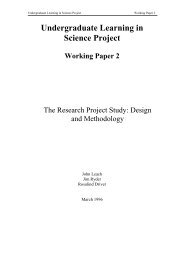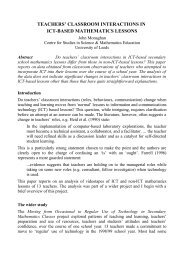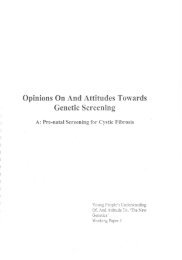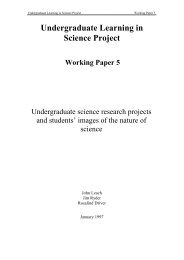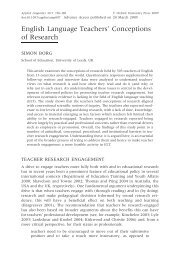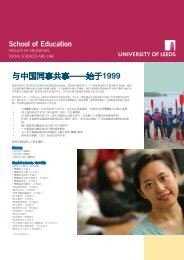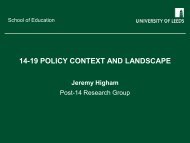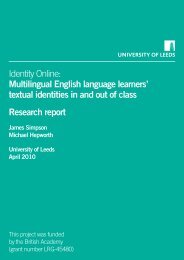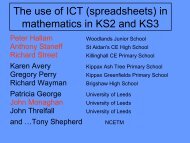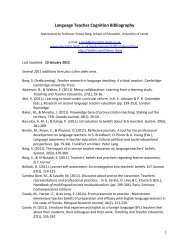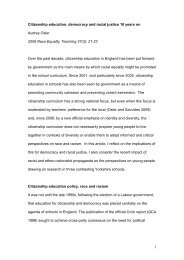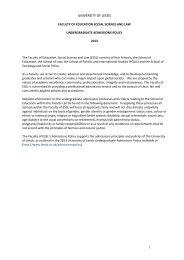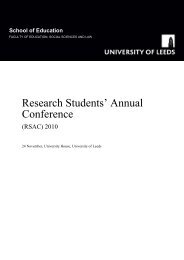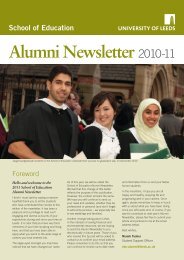Language Teacher Cognition Bibliography - School of Education
Language Teacher Cognition Bibliography - School of Education
Language Teacher Cognition Bibliography - School of Education
You also want an ePaper? Increase the reach of your titles
YUMPU automatically turns print PDFs into web optimized ePapers that Google loves.
Karavas-Doukas, E. (1996). Using attitude scales to investigate teachers' attitudes to the communicative approach. Elt<br />
Journal, 50(3), 187-198.<br />
Kennedy, C., & Kennedy, J. (1996). <strong>Teacher</strong> attitudes and change implementation. System, 24(3), 351-360.<br />
Moats, L. C., & Lyon, G. R. (1996). Wanted: <strong>Teacher</strong>s with knowledge <strong>of</strong> language. Topics in Learning Disabilities, 16,<br />
73-86.<br />
Numrich, C. (1996). On becoming a language teacher: Insights from diary studies. TESOL Quarterly, 30(1), 131-153.<br />
Richards, J. C. (1996). <strong>Teacher</strong>s' maxims in language teaching. TESOL Quarterly, 30(2), 281-296.<br />
Richards, J. C., Ho, B., & Giblin, K. (1996). Learning how to teach in the rsa cert. In D. Freeman & J. C. Richards (Eds.),<br />
<strong>Teacher</strong> learning in language teaching (pp. 242-259). Cambridge: Cambridge University Press.<br />
Schulz, R. A. (1996). Focus on form in the foreign language classroom: Students' and teachers' views on error<br />
correction and the role <strong>of</strong> grammar. Foreign <strong>Language</strong> Annals, 29(3), 343-364.<br />
Smith, D. B. (1996). <strong>Teacher</strong> decision making in the adult esl classroom. In D. Freeman & J. C. Richards (Eds.), <strong>Teacher</strong><br />
learning in language teaching (pp. 197-216). Cambridge: Cambridge University Press.<br />
Sturtevant, E. G. (1996). Lifetime influences on the literacy-related instructional beliefs <strong>of</strong> experienced high school<br />
history teachers: Two comparative case studies. Journal <strong>of</strong> Literacy Research, 28(2), 227-257.<br />
Tsui, A. B. M. (1996). Learning how to teach esl writing. In D. Freeman & J. C. Richards (Eds.), <strong>Teacher</strong> learning in<br />
language teaching (pp. 97-119). Cambridge: Cambridge University Press.<br />
Ulichny, P. (1996). What's in a methodology In D. Freeman & J. C. Richards (Eds.), <strong>Teacher</strong> learning in language<br />
teaching (pp. 178-196). Cambridge: Cambridge University Press.<br />
Webster, A., Beveridge, M., & Reed, M. (1996). Conceptions <strong>of</strong> literacy in primary and secondary school teachers.<br />
Journal Of Research In Reading, 19(1), 36-45.<br />
Woods, D. (1996). <strong>Teacher</strong> cognition in language teaching.<br />
Berry, R. (1995). Grammar terminology: Is there a student-teacher gap In D. Nunan, R. Berry & V. Berry (Eds.),<br />
<strong>Language</strong> awareness in language education (pp. 51-68). Hong Kong: Faculty <strong>of</strong> <strong>Education</strong>, University <strong>of</strong> Hong<br />
Kong.<br />
Kern, R. G. (1995). Student's and teachers beliefs about language learning. Foreign <strong>Language</strong> Annals, 28(1), 71-92.<br />
Konopak, B., & Wilson, E. K. (1995). Formal and practical knowledge in reading education: Examining preservice,<br />
inservice, and university teachers' perspectives on classroom instruction. Yearbook- National Reading<br />
Conference, 44, 400-406.<br />
Lamb, M. (1995). The consequences <strong>of</strong> inset. Elt Journal, 49(1), 72-80.<br />
Lightbown, P. M., & Spada, N. (1995). How languages are learned. Oxford: Oxford University Press.<br />
Mantle-Bromley, C. (1995). Positive attitudes and realistic beliefs: Links to pr<strong>of</strong>iciency. Modern <strong>Language</strong> Journal, 79,<br />
372-386.<br />
Mosenthal, J. H. (1995). Change in two teachers' conceptions <strong>of</strong> math or writing instruction after in-service training.<br />
Elementary <strong>School</strong> Journal, 95(3), 263-277.<br />
Pailliotet, A. W. (1995). Seven elementary preservice teachers' perspectives <strong>of</strong> literacy: A longitudinal study. Yearbook-<br />
National Reading Conference, 44, 66-84.<br />
Scott, R., & Rodgers, B. (1995). Changing teachers' conceptions <strong>of</strong> teaching writing: A collaborative study. Foreign<br />
<strong>Language</strong> Annals, 28(2), 234-246.<br />
Shi, L., & Cumming, A. (1995). <strong>Teacher</strong>s' conceptions <strong>of</strong> second language writing instruction: Five case studies. Journal<br />
Of Second <strong>Language</strong> Writing, 4(2), 87-111.<br />
Skelton, C., & Hardman, F. (1995). Doing reading: Primary student teachers' beliefs about the teaching <strong>of</strong> reading.<br />
Curriculum, 16(1), 48.<br />
S<strong>of</strong>is Guimaraes, A., & Youngman, M. (1995). Portuguese preschool teachers' beliefs about early literacy development.<br />
Journal Of Research In Reading, 18(1), 39.<br />
Williamson, J., & Hardman, F. (1995). Time for refilling the bath A study <strong>of</strong> primary student-teachers' grammatical<br />
knowledge. <strong>Language</strong> And <strong>Education</strong>, 9(2), 117-134.<br />
Andrews, S. (1994). The grammatical knowledge/awareness <strong>of</strong> native-speaker EFL teachers: What the trainers say. In<br />
M. Bygate, A. Tonkyn & E. Williams (Eds.), Grammar and the language teacher. (pp. 69-89). London: Prentice<br />
Hall International.<br />
Beach, S. A. (1994). <strong>Teacher</strong>'s theories and classroom practice: Beliefs, knowledge, or context Reading Psychology,<br />
15(3), 189-196.<br />
Johnson, K. E. (1994). The emerging beliefs and instructional practices <strong>of</strong> preservice English as a second language<br />
teachers. Teaching and <strong>Teacher</strong> <strong>Education</strong>, 10(4), 439-452.<br />
23


